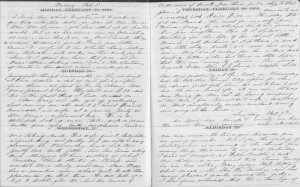 The Civil War was a time of conflict and distress. While we often hear stories of the courageous men who fought the bloody battles of a terrible and long war, the battles did not stop on the fields. Citizens from all states and backgrounds gathered strength and stepped into positions they never thought possible, including Betsey Jennings Nixon, who discovered fresh reserves of strength as the war progressed.
The Civil War was a time of conflict and distress. While we often hear stories of the courageous men who fought the bloody battles of a terrible and long war, the battles did not stop on the fields. Citizens from all states and backgrounds gathered strength and stepped into positions they never thought possible, including Betsey Jennings Nixon, who discovered fresh reserves of strength as the war progressed.
The NEHGS Library holds the diary of Betsey Jennings Nixon in its R. Stanton Avery Special Collections. The diary has been digitized and is available on the American Ancestors Digital Collections website. Betsey, the daughter of William and Louise (Sheldon) Nixon, was born in 1839 and grew up in Ohio, living in several neighboring states before eventually moving to Colorado where her sons had settled. Continue reading ‘Eyes dry as dust’




